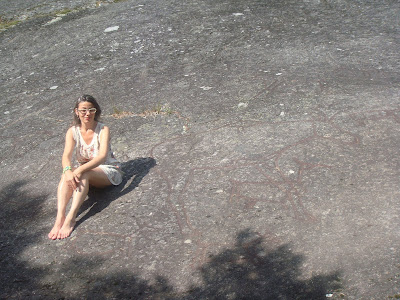CULTURE
Today I had lunch on top of the 6500 year old petroglyphs down the road from Eikesdal. There were three big stones, each depicting different cultures: hunting, fishing, and boat racing. God almighty, I thought, some things never change. Petroglyphs have always resonated with me in a very virile way. Men's assertiveness in these depictions on stone is unmistakable. Women are not present, and hence their more subtle ways of communicating are not represented. This thought stayed with me as I visited the house where Bjørnstjerne Bjørnson lived. He was the son of a vicar who battled all his life with the small community along the waters of Eikesdal for a bigger house with a better view. He won. The big house is, however, sterile, and filled with what one can sense must have been the order of the day on its premises: imposed awe.
The living chambers exude a woman's touch: the pots, the stoves, the crib, the clothes, the books, all had a soul. For some bizarre reason, while smelling the invisible presence of unacknowledged women around, I thought of the lines of another patriarch. The mediaeval philosopher Moses Maimonides. All the same, I thought to myself, from the stone age to the middle ages and on to the post-Romantic age, some philosophies are still valid. As I have a thorough distaste for all clergy, I have to say that when I entered the big preaching room of Bjørnson's pastorate, I saw Maimonides at the pulpit giving a lesson from his bible, The Guide for the Perplexed, that would have been particularly beneficial for the literalists of the 19th century, who were into preaching the word as was written: “Do not consider it proof just because it is written in books, for a liar who will deceive with his tongue will not hesitate to do the same with his pen.” I fled the almost empty room and entered another with books in it. I took a look at Bjørnson's mother's book of Norwegian psalms and opened it randomly. This question caught my eyes: “And will I not wear my bridal attire for you?”
I ended the day at the daisy house, the one beyond time, as I tried to escape another of Maimonides's lines: “The risk of a wrong decision is preferable to the terror of indecision.” The daises whispered: here you are nothing, and therefore, you can do nothing. What a relief, I have to neither assert myself, nor communicate. I can just wait for nothing to take place. My place, and that of time.
















The living chambers exude a woman's touch: the pots, the stoves, the crib, the clothes, the books, all had a soul. For some bizarre reason, while smelling the invisible presence of unacknowledged women around, I thought of the lines of another patriarch. The mediaeval philosopher Moses Maimonides. All the same, I thought to myself, from the stone age to the middle ages and on to the post-Romantic age, some philosophies are still valid. As I have a thorough distaste for all clergy, I have to say that when I entered the big preaching room of Bjørnson's pastorate, I saw Maimonides at the pulpit giving a lesson from his bible, The Guide for the Perplexed, that would have been particularly beneficial for the literalists of the 19th century, who were into preaching the word as was written: “Do not consider it proof just because it is written in books, for a liar who will deceive with his tongue will not hesitate to do the same with his pen.” I fled the almost empty room and entered another with books in it. I took a look at Bjørnson's mother's book of Norwegian psalms and opened it randomly. This question caught my eyes: “And will I not wear my bridal attire for you?”
I ended the day at the daisy house, the one beyond time, as I tried to escape another of Maimonides's lines: “The risk of a wrong decision is preferable to the terror of indecision.” The daises whispered: here you are nothing, and therefore, you can do nothing. What a relief, I have to neither assert myself, nor communicate. I can just wait for nothing to take place. My place, and that of time.


















Comments